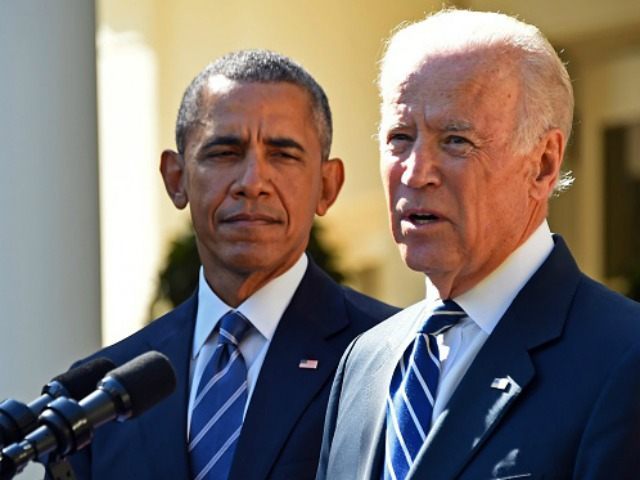AFP on Sunday found Iraq divided over the U.S. presidential election. Pro-Iran factions, including terrorist groups like the one that killed an American civilian contractor near Kirkuk in December 2019, were pleased to hear that American media outlets had proclaimed President Donald Trump lost the election to challenger Joe Biden.
Others were unhappy with that outcome, especially those who feared a Biden victory would embolden Iran and its proxies in Iraq.
Iran-controlled factions in Iraq were excited by President Trump’s reported defeat, since they hold him responsible for the “greatest crime” of ordering airstrikes that killed Iranian Islamic Revolutionary Guard Corps (IRGC) commander Gen. Qasem Soleimani and one of his most important Iraqi allies, Abu Mahdi al-Muhandis, co-founder of the Kataeb Hezbollah (KH) terrorist organization.
KH is the Iran-controlled Shiite militia that launched rocket attacks against Iraqi bases hosting U.S. personnel in late 2019. One of KH’s rocket attacks killed civilian contractor Nawres Hamid, a 33-year-old naturalized U.S. citizen, on December 27. Trump responded with the airstrike that killed Soleimani and Muhandis in January and later threatened sanctions after the Iraqi parliament voted to expel all foreign troops.
“Trump’s era was a very negative one, a period of demolition. We hope the new administration will resolve this, by ending the crisis and withdrawing its troops,” KH spokesman Mohammad Mohyi told AFP.
Mohyi said Trump “acts in an unpredictable way” and speculated he could “target our leadership” during the presidential transition.
An Iraqi official thought Trump might “up the ante” with a “bucket list of sanctions” against Iran’s interests in Iraq. He thought U.S. military action against Iranian proxies like KH was unlikely but “wouldn’t be totally surprised” if it occurred.
Other influential Iraqis aligned with Iran expressed similar sentiments, to the consternation of Iraqis like a blogger named Youssif, who found it disturbing that so many ruthless forces in his country were celebrating a Biden victory.
“Those politicians, who called the US ‘evil’ and raised the phrase ‘Death to America,’ congratulated Biden for winning the presidential election – as if an old friend has won,” Youssif said.
“We don’t want Obama’s policies to return to our country once again,” said lawmaker Dhafer al-Ani.
“As an Iraqi, I prefer that Trump stays in power,” elderly Baghdad resident Abu Saad opined. He added that many Iraqis doubt a change in U.S. leaders would dramatically change American policy toward Iraq.
AFP noted that Iraqi Prime Minister Mustafa al-Kadhemi met with Trump and his top officials while visiting Washington in August, but he also met with House Speaker Nancy Pelosi (D-CA), a meeting his advisers characterized as an effort to “open the door” in case Biden won. Iraqi President Barham Saleh called Biden a “friend and trusted partner” after U.S. media called the presidential election for the Democrat.
Al Jazeera News noted that Iraq was “visibly absent” as an issue during the U.S. election, perhaps reflecting the more “pressing concerns” of issues like the Iran nuclear deal and peace deals with Israel.
Al Jazeera found Baghdad “cautious but hopeful of prosperous relations ahead” after the election, noting that Iraq has experienced much of the fallout from tensions between the Trump administration and Iran. An anonymous senior government official in Baghdad thought it would be “good for Iraq” if a Biden win resulted in negotiations and diplomacy with Iran because Iraq is “inescapably stuck” between Washington and Tehran.
Other Iraqi analysts told Al Jazeera they expected Iran to minimize bad behavior and keep its Iraqi militia on a shorter leash because Tehran hopes Biden will re-enter the nuclear deal and lift Trump’s sanctions against Iran.
A few skeptical commentators recalled Biden’s “serious errors and lapses in judgment” on Iraq, as Renad Mansour of the Iraq Initiative at Chatham House in London put it. Biden’s 2006 proposal to divide Iraq into three countries, one each for Sunni Muslims, Shiite Muslims, and Kurds, is not fondly remembered in Baghdad.
The Times of Israel noted that Iraqi television gave extensive coverage to the U.S. presidential race, but “reactions on the street have been muted,” including reactions among participants in the perpetual anti-government demonstrations in Baghdad. The demonstrators evidently did not believe the outcome of the American election would have much effect on their own travails.

COMMENTS
Please let us know if you're having issues with commenting.